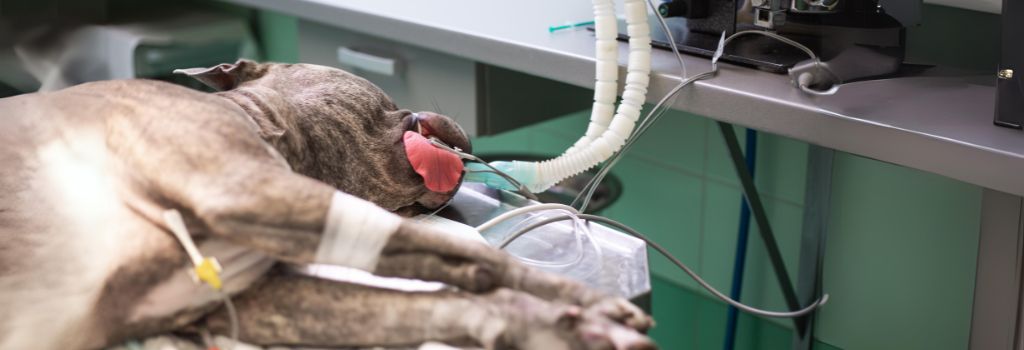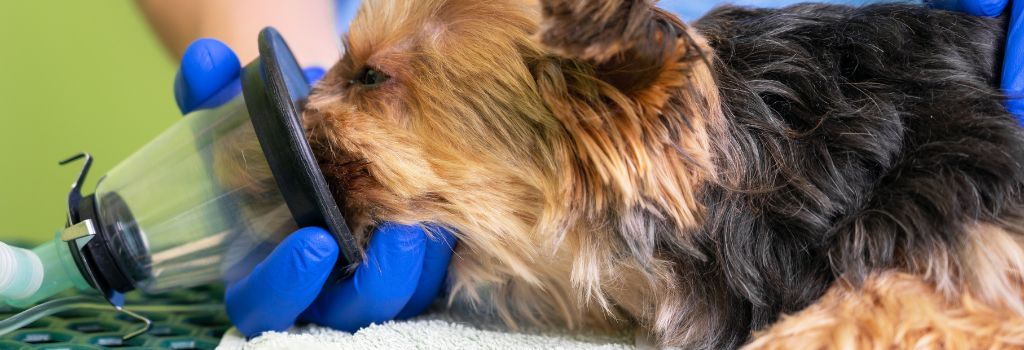When a dog requires a procedure that involves anesthesia, it is natural for owners to have questions. At A Gentle Vet, anesthesia is administered with careful planning, appropriate monitoring, and protocols designed to support a safe and smooth experience for your pet.
Types of Anesthesia for Dogs
Anesthesia allows our team to perform medical and surgical procedures without causing pain or distress. The two primary types used in dogs are:
- General anesthesia: A combination of medications that induces unconsciousness for the duration of a procedure. This is used for surgeries and any procedure requiring the patient to remain still.
- Local anesthesia: Medication injected into a specific area to block sensation while the patient remains awake. This is used for minor procedures involving a small, localized region.

Dog Breeds with Known Anesthesia Sensitivities
Certain breeds can have anatomical or metabolic characteristics that influence how they respond to anesthesia. With proper preparation and monitoring, anesthesia can be performed safely.
Dog breeds that may require specific anesthesia considerations include:
- Brachycephalic breeds: Pugs, Boston Terriers, Bulldogs, Shih Tzus
- Sighthounds: Greyhounds, Whippets, Salukis, Italian Greyhounds
- Herding breeds: Shetland Sheepdogs, Australian Shepherds
- Giant breeds: Great Danes, St. Bernards
- Toy breeds: Chihuahuas, Yorkshire Terriers
Dachshunds, Doberman Pinschers, and Boxers may also have breed-specific considerations that veterinarians account for when planning anesthesia.

What to Expect Before Your Dog Undergoes Anesthesia
Before a dog undergoes anesthesia, a veterinarian performs a full physical examination, reviews medical history, and discusses any relevant risk factors. Pre-anesthetic blood testing is often recommended to screen for underlying conditions that could affect anesthesia or recovery.
In most cases, dogs should not eat after 8:00 p.m. the night before anesthesia to reduce the risk of regurgitation and aspiration. Water is typically allowed overnight, but should be removed the morning of the procedure. Puppies, diabetic dogs, and certain medical cases may have different instructions.
Owners should expect their dog to stay at the hospital for several hours. Some procedures require discharge later in the day, while others may require overnight monitoring depending on the surgery or the patient’s condition. We will always follow up with the pet parent and keep communication ongoing during your pet's procedure and time with us.
Possible Complications of Your Pet Undergoing Anesthesia
Anesthesia in dogs is considered safe, with an estimated mortality rate of approximately 0.17%.
While complications are uncommon, possible risks include:
- Low blood pressure (hypotension)
- Low body temperature (hypothermia)
- Low blood oxygen (hypoxemia)
- Respiratory depression (hypoventilation)
- Regurgitation and aspiration
- Corneal irritation or ulcers
Age, overall health status, and pre-existing medical conditions can increase risk. Thorough pre-anesthetic evaluation and modern monitoring help reduce these concerns.
Anesthetic Monitoring for Your Pet
During anesthesia, the veterinary team monitors vital parameters continuously.
While your pet is under anesthesia, our trained team will monitor and chart:
- Heart rate and rhythm
- Blood pressure
- Respiratory rate
- Oxygen saturation
- Body temperature
Assisted ventilation is provided if needed, particularly for patients with respiratory or cardiac disease. Adjustments to anesthetic depth are made throughout the procedure based on the patient’s response.
Home Care for Your Pet After Anesthesia
After returning home, dogs benefit from a quiet environment and close observation. Small meals may be offered once they are fully awake unless otherwise directed. Activity should be limited for several days, especially if an incision is present.
After anesthesia, dog owners should watch for:
- Prolonged lethargy (more than 24–48 hours)
- Signs of pain or discomfort
- Vomiting, diarrhea, or loss of appetite
- Changes in urination
- Redness, swelling, discharge, or bleeding at the incision site
If you notice any concerning changes or have questions after your pet's surgery, please don't hesitate to call. We are here to support you every step of the way.
Our Approach to Your Pet's Anesthesia
Anesthesia is an important part of veterinary medicine, and modern techniques have made it safer and more predictable. At A Gentle Vet, we use pre-anesthetic testing, individualized protocols, and continuous monitoring to support safe outcomes before, during, and after anesthesia.
If you have questions about anesthesia or an upcoming procedure, please call us at (801) 968-9932 or email [email protected].
